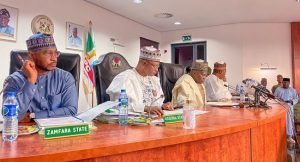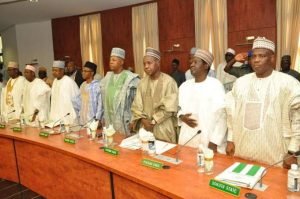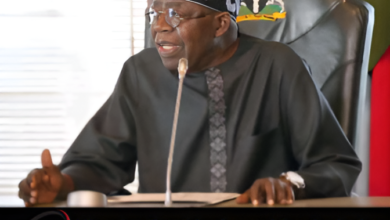Northern Governors reject Tax Reform Bill – “our people are already suff€ring”

In the new events, the governors of Northern Nigeria have come out very strongly against a tax reform bill that is awaiting consideration by the National Assembly (NASS). Since the introduction of this bill, which seeks to replace the existing structure of taxes, various stakeholders, especially the Northern governors, have grossly opposed the bill.
Advertisements
They fear the effects that may accrue to the economy, business ventures, and even the well-being of their supporters.
Background of the Proposed Tax Reform Bill 
The proposed tax reform bill is a measure taken by the federal government as part of its ongoing efforts to enhance the efficiency of tax collection in the country and increase the overall tax revenues. Advocates claim that implementation of the reform will help the country diversify its economy and decrease dependence on oil income.
However, the details of this bill have elicited concern among the Northern governors, who have criticized the provisions of the bill for inequality in favor of their regions.
Main Issues Discussed by the Northern Governors
1. Economic Impact: Northern governors opine that the proposed tax increases will hamper the development of their respective states. They still consider it the major reason they think that increasing taxes on businesses and individuals will discourage investment and ultimately discourage employment chances in a region where the youth unemployment rate is high.
2. Burden on Citizens: The governors have specifically complained that this new tax reform system will be an imposition on the ordinary citizen. The people in the North still pay for goods and services and basic needs, and if new taxes are introduced, many families are likely to be pulled deeper into the hardship line. “Our people are already struggling economically; we cannot put more taxes that they have to pay on them,” said one governor during an interview.
3. Impact on Local Businesses: SMEs are crucial to the economy of the Northern region given that it is made up of organized SMEs.
The governors worry that such a tax increase could put pressure on the cost of operation of these businesses, hence reducing their competitive ability. “We have to defend our local industries; this is the key to the improvement of our economy,” another governor underscored.
4. Inequitable Taxation: Some of the northern governors have strongly argued that the proposed tax measures would not capture their states’ economic realities. These people substantiate their stand by explaining to the international community that if indeed a general taxation system is to be adopted, then it will unkindly play into the hands of deepening unfair competition between the North and a relatively more developed South.
5. Lack of Consultation: The governors have taken time to lampoon the federal government for insufficient involvement of state chiefs before coming up with such drastic measures. One governor said,
“We need to sit where we decide on these policies as they affect our people.”
This called for a good working relationship between the federal and state governments.
The Call to Action against the Tax Reform Bill

Due to these reasons, all the Northern governors have jointly urged the National Assembly not to pass the tax reform bill. They have said that they want the lawmakers to rethink the effects of the bill and seek a friendly debate with the concerned state governments. Some governments do not have different things to say: “We are not against tax reform; we are against reforms that do not consider the realities of our people.” Said a leading governor.
Other articles
Court remands 50-year-old over alleged drug dealing
Vice President Harris Warns: ‘Don’t Be Fooled, Trump Isn’t Thinking About You!’
“‘I Was Angry When I Met Him’ – Regina Daniels Shares How She Found True Love In Ned Nwoko
Conclusion
The refusal of the Northern governors to support the tax reform bill that was just proposed shows that tax policy in Nigeria is not an easy one. While the National Assembly is at it, they must ensure they are weighing on the best interests of all stakeholders specific to the areas that can be greatly affected.
Thus, the demand for a fair and integrated approach to the process of tax reforms is not only based on the principle of justice but also on the perspectives for the stabilization and development of the national economy.









